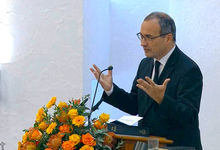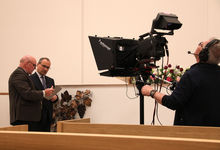Women in ministry: a debate full of contrasts
There was certainly plenty of buzz on the social media sponsored by the New Apostolic Church. The subject of women in ministry generated hundreds of comments. And the reactions could hardly have been more different.

Naturally there were some posts that used words like embarrassing and shameful to target the “old men” antagonists in the Church and accuse the organisation of sexism and oppression.
But that was more of a peripheral note in a debate that was at times tough, but mostly fair. “We can all only learn from one another, share our ways of seeing things, and thereby make a collective contribution to the development of the Church as willed by God,” opined one commentator from the south of Germany.
The process
The background: in our annual interview with Chief Apostle Jean-Luc Schneider, he presented the decision-making process that the District Apostle Meeting will follow in the matter of the ordination of women. This initiative was largely met with approval: “I am glad that this is being approached in such a structured and transparent manner. Not everyone is enthusiastic about such an idea, but this way, everyone can understand the arguments and the decisions,” wrote one of the participants in the discussion.
Criticism was levelled at the length of time the deliberations have taken, however: it has been clear since 2014 that this topic would be on the agenda. There has been concrete discussion on the issue since November 2018. “When it comes to landmark decisions that are of an absolutely existential nature, it seems nobody is in a rush,” read one comment on Facebook. “Fifteen years ago we wouldn't even have found out that this matter was up for discussion at the conference.”
And still another commentator went on to add: “What’s so bad about it taking another couple of years if it means that the decision can then be supported by everyone?” After all: “We have seen other churches split apart for the very same reason,” says one contributor from Papua New Guinea who is concerned over the unity of the Church.
The positions
“As a woman, I would like to be able to serve the congregation in the very same way that a man can serve. I want to be a minister and be allowed to exercise all ministries,” said one sister from Germany, who in so doing summarised the prevailing expectations among the German-speaking commentators. “It is simply a matter of equal rights,” emphasises a sister from the western part of Germany. “Ordaining women does not imply an exchange of roles. It simply means that women can fulfil their calling to serve in the same manner as men,” underlines one British participant.
“It is interesting that this discussion has been predominantly initiated by members of the NAC in Germany, a reflection of the social changes in our country,” says a commentator from Germany. And sure enough: in Central Africa, for example, there are more pressing concerns, such as church construction or the further expansion of charitable initiatives. But there is also a lack of understanding in Europe: “I cannot understand how one can feel discriminated just because one cannot hold an office in the Church,” opines another sister from the eastern part of Germany, whose views reflect those of a number of other women.
Various lines of reasoning
Both advocates and opponents agree on one thing: the path the Church is taking must have a solid biblical foundation. The problem with this is that both sides can find verses that match their opinions.
Some make reference to Junia, a woman whom the epistle to the Romans describes as “of note among the Apostles”. However, “Junia was probably a very zealous and successful missionary, but likely not an Apostle in the sense we understand it”, explains a Swiss commentator with knowledge of the prevailing scholarly consensus on the source text.
Others pose the question: “Why didn’t Jesus put a woman on the list of His Apostles?” The answer to this question came from Australia: “Very simply because it wasn’t done in that time. Times have changed, our needs have changed, and our understanding in most cases has grown. There are many things written in Scripture that we no longer do. The unfaithful in Jesus’ time wanted to go back to the laws of Moses, but times had changed through God’s Son. He has left that work and that power with the Apostle ministry, and things will continue to evolve as they have since the time of Moses.”
Photo: vegefox.com - stock.adobe.com











